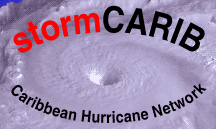
 |
Press Release |
|
|
"Atlantic Hurricane Season Off with a Whimper" (Source: Reuters, 6/1/01) MIAMI - The 2001 Atlantic hurricane season dawned quietly on Friday but storm experts warned people in hurricane alley early-season peace was no reason to let down your guard. ``All's quiet in the Atlantic,'' said hurricane specialist James Franklin, on first-day duty at the U.S. National Hurricane Center near Miami. June storms are a relative rarity in the Atlantic hurricane season, which runs from June 1 to November 30. Peak hurricane activity strikes in late August, September and early October. With climatic indicators on neutral, the prominent forecasters of nature's biggest storms are projecting an average season. U.S. government experts say residents of the Caribbean basin and the U.S. East and Gulf coasts are likely to see five to seven hurricanes and eight to 11 tropical storms. Colorado State University Professor William Gray, a forecaster who has had some success predicting hurricane activity in the past, has projected 10 tropical storms, with six becoming hurricanes, three of them ``major'' with top winds of 111 mph or higher. But the National Hurricane Center notes that ``average'' does not mean ``routine.'' The costliest U.S. hurricane ever, 1992's Andrew, the most powerful, the 1935 Labor Day storm that ravaged the Florida Keys, and the deadliest, the 1900 Galveston, Texas, hurricane that killed more than 8,000 people, all happened in relatively quiet years for hurricane activity. Last year was an exceptionally busy season with 14 named storms but none threatened the U.S. coast. `We really try to de-emphasize the activity of the hurricane season,'' Franklin said. The broad climatic signals that forecasters use to predict hurricane activity, including Atlantic surface temperatures, barometric pressures and the ``El Nino'' eastern Pacific warm-water phenomenon, are providing few clues this year. ``Nobody can say with any great confidence what kind of season it's going to be. There are no strong signals either way,'' Franklin said. ``El Nino is a very strong negative influence on hurricane formation. But we don't have one and we don't think we're going to get one.'' A recent poll commissioned by the American Red Cross found that while 58 percent of U.S. coastal residents from North Carolina to Texas are worried about the danger of hurricanes, nearly half do not have evacuation plans or disaster supply kits at the ready. ``Our greatest concern is that people have evidently been lulled into a false sense of security because the United States was spared from a major hurricane last year,'' American Red Cross Disaster Services vice president Dr. John Climb said. Although the first day of the hurricane season is usually storm-free, it serves as a wake-up call to those in storm zones, forecasters said. ``This is the time to start making sure you're prepared so if a storm threatens you're not out standing in line for supplies with everybody else,'' Franklin said.
Back to Homepage